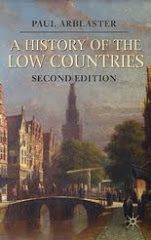
Here's a picture of Peking University Library (or, as it says on the sign, Beijing daxue tushuguan). PKU hosted a Belgian Cultural Festival where I was invited to lecture, and the photograph shows me on my way to present a copy of the History of the Low Countries to the acquisitions librarian.
The lecture was on a number of books about China published in the Habsburg Netherlands in the 17th and 18th centuries, and how they reveal as much about the Low Countries as they do about China. In the early 17th century, Dutch and French works derived from Nicholas Trigault s.j.'s De Christiana Expeditione apud Sinas. In the later 17th century a pirated (or more precisely: hijacked) Antwerp edition of Joan Nieuhof's account of a Dutch East India Company trade mission to the Manchu Emperor, Het Gezantschap der Neêrlandtsche Oost-Indische Compagnie, aan den grooten Tartarischen Cham, den tegenwoordigen Keizer van China. And in the 18th century the Brussels printing of a letter from a Jesuit missionary about the history of Chinese script (in response to the hypothesis of the director of the Imperial and Royal Academy in Brussels that it was related to Egyptian hieroglyphs).


